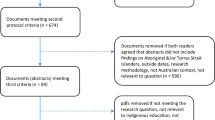Abstract
Our response to Hewson and Ogunniyi’s paper focuses, on the one hand, on some of the underlying tensions associated with alinging indigenous knowledge systems with westernized science in South African science classrooms, as suggested by the new, post-apartheid, curriculum. On the other hand, the use of argumentation as a vehicle to accomplish the alignment when the jury is still out on the appropriateness of argumentation as a pedagogical and research tool heightens the tension. We argue that the need for education stakeholders from indigenous heritages to value, know and document their own indigenous knowledge becomes paramount. The textualizing of indigenous knowledge, as has been done in western science, will create repositories for teachers to access and may help with the argumentation strategies such as advocated by the authors.
Similar content being viewed by others
Notes
CAT is a dialogic derivative of Toulmin’s (1958) Argument Pattern (TAP).
Disadvantaged schools in South Africa were schools that, before 1994, were reserved for non-White South Africans. Compared to White schools, where tuition was free and education was mandatory, schools reserved for Black, Indians and Coloured (non-White) South Africans were inferior, lacked basic amenities and resources and were not tuition-free (Clark and Worger 2004). Per capital expenditure on Black (Bantu) education, in the 1970s, was one-tenth of that spent on education for White South Africans (Byrnes 1996).
References
Barnhardt, R., & Kawagley, A. O. (2005). Indigenous knowledge systems and Alaska Native ways of knowing. Anthropology & Education Quarterly, 36, 8–23.
Braund, M., Lubben, F., Scholtz, Z., Sadeck, M., & Hodges, M. (2007). Comparing the effect of scientific and socio-scientific argumentation tasks: Lessons from South Africa. School Science Review, 88(324), 67–76.
Byrnes, R. M. (1996). South Africa: A country study. Washington: GPO for the Library of Congress.
Clark, N. L., & Worger, W. H. (2004). South-Africa—The rise and fall of apartheid. Seminar Studies in History. Pearson Education Limited. (pp. 48–52).
Crossman, P., & Devisch, R. (2002). Endogenous knowledge in anthropological perspective: A plea for conceptual shift. In C. A. Odora Hoppers (Ed.), Indigenous knowledge and the integration of knowledge systems: Towards a philosophy of articulation (pp. 96–128). Claremont, SA: New Africa Books.
Department of Education. (2011). National curriculum statement grades R—12: Curriculum and Assessment Policy (CAPS) life sciences. Pretoria: Department of Education.
Harding, S. G. (1998). Is science multicultural?: Postcolonialisms, feminisms, and epistemologies. Bloomington, Indiana: Indiana University Press.
Lemke, J. L. (1990). Talking science: Language, learning and values. Norwood, NJ: Ablex Publishing.
Ngara, C. (2007). African ways of knowing and pedagogy revisited. Journal of Contemporary Issues in Education, 2(2), 7–18.
Ogunniyi, M. B. (2004). The challenge of preparing and equipping science teachers in higher education to integrate scientific and indigenous knowledge systems for their learners. South African Journal of Higher Education, 18, 289–304.
Ogunniyi, M. B., & Hewson, M. G. (2008). Effect of an argumentation-based course on teachers’ disposition towards a science-indigenous knowledge curriculum. International Journal of Environmental & Science Education, 3(4), 159–177.
Owuor, J. A. (2007). Integrating African indigenous knowledge in Kenya’s formal education system: The potential for sustainable development. Journal of Contemporary Issues in Education, 2(2), 21–37.
Toulmin, S. (1958). The uses of argument. Cambridge, England: Cambridge University Press.
von Aufschnaiter, C., Erduran, S., Osborne, J., & Simon, S. (2008). Arguing to learn and learning to argue: Case studies of how students’ argumentation relates to their scientific knowledge. Journal of Research in Science Teaching, 45, 101–131.
World Bank. (1998). Indigenous knowledge for development: A framework for action. Knowledge and Learning Center, Africa Region. Washington: World Bank Publications.
Zohar, A., & Nemet, F. (2002). Fostering students’ knowledge and argumentation skills through dilemmas in human genetics. Journal of Research in Science Teaching, 39, 35–62.
Author information
Authors and Affiliations
Corresponding author
Additional information
This review essay addresses issues raised in Mariana G. Hewson and Meshach B. Ogunniyi’s paper entitled: Argumentation-teaching as a method to introduce indigenous knowledge into science classrooms: opportunities and challenges. Cultural Studies of Science Education. doi:10.1007/s11422-010-9303-5.
Rights and permissions
About this article
Cite this article
Òtúlàjà, F.S., Cameron, A. & Msimanga, A. Rethinking argumentation-teaching strategies and indigenous knowledge in South African science classrooms. Cult Stud of Sci Educ 6, 693–703 (2011). https://doi.org/10.1007/s11422-011-9351-5
Received:
Accepted:
Published:
Issue Date:
DOI: https://doi.org/10.1007/s11422-011-9351-5




